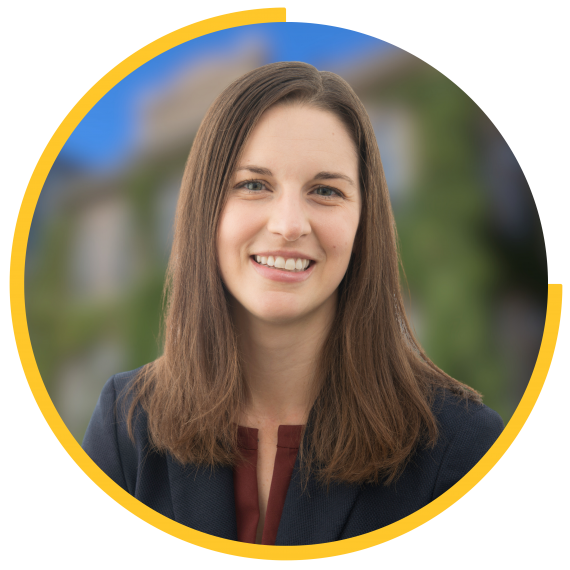Sara Fulmer
Our People

My expertise in educational development stems from my experiences as a faculty member, K-6 educator, and educational researcher. Prior to joining the University of Guelph in 2017, I was an Assistant Professor of Educational Psychology at SUNY Oneonta. I also held educational development positions at the University of Louisville, Wellesley College, and the University of Notre Dame. I earned my PhD in Developmental Psychology from the University of Notre Dame, and MA, BA, and BEd from Brock University.
As a research collaborator across disciplines, my scholarship focuses on student motivation and emotions, effective teaching, assessment of learning and motivation, and professional development for teachers and educational developers. My research and approach to educational development are motivated by a dedication to holistically address instructors’ goals, needs, and well-being, while also acknowledging and respecting the intricacies of how students learn.
Find me on Google Scholar and LinkedIn.
Selected publications:
Boivin, S., Gillis, D, Fulmer, S. M., Mattucci, S, Moussa, S., & Jacobs, S. (2025). Developing transferable skills: Does disciplinary topic matter? International Journal of Higher Education, 14, 125-140. https://doi.org/10.5430/ijhe.v14n6p125
Mohammad, N. M., Demers, M., McCubbin, E., Mitchell, J., & Fulmer, S. M. (2025). How college students use ChatGPT. Pedagogical Research, 10(4), em0250. https://doi.org/10.29333/pr/17428
Aspenlieder, E., & Fulmer, S. (2025). AI Playbook for Teaching and Learning Leaders: A Community Guide. Guelph, ON: University of Guelph. https://books.lib.uoguelph.ca/aiplaybook
Stewart, C. L., Fulmer, S. M., & Saharan, S. (2025). Recognizing and developing mid-career faculty as educators, educational leaders, and SoTL scholars: The University Teaching Leadership Fellows. Journal of Faculty Development, 39, 106-108.
Stewart, C. L., & Fulmer, S. M. (2024). The Teaching and Learning Network: A model of interdisciplinary networking as educational leadership and faculty development. Journal of Faculty Development, 38, 83-85.
Toft, L. E. B., Richie, J., Wright, J. M., Amraotkar, A., Katrapati, P., Fulmer, S. M., Dainty, K. N., Chugh, S. S., & Halperin, H. (2022). A new era of lay rescuer CPR training: An interactive approach for engaging high schoolers. Journal of the American College of Cardiology, 80, 2251-2253. doi: 10.1016/j.jacc.2022.09.040
Killpack, T. L., Fulmer, S. M., Roden, J., Dolce, J., & Skow, C. (2020). Increased scaffolding and inquiry in introductory biology lab enhance experimental design skills and sense of scientific ability. Journal of Microbiology and Biology Education, 21, 1-10. doi: 10.1128/jmbe.v21i2.2143
Walsh, J., Fulmer, S. M., & Pociask, S. (2019). Cross-peer mentorship in introductory philosophy classes: The “Home Base” Mentoring Program. American Association of Philosophy Teachers Studies in Pedagogy, 5, 144-168. doi: 10.5840/aaptstudies2019121346
Donnell, A. M., Fulmer, S. M., Smith, T. W., Bostwick Flaming, A. L., & Kowalik, A. (2018). Educational Developer Professional Development Map (EDPDM): A tool for educational developers to articulate their mentoring network. Journal on Centers for Teaching and Learning, 10, 3-23. http://openjournal.lib.miamioh.edu/index.php/jctl/article/view/195
Killpack, T. L., & Fulmer, S. M. (2018). Development of a tool to assess interrelated experimental design in introductory biology. Journal of Microbiology and Biology Education, 19(3), 1-10. doi: 10.1128/jmbe.v19i3.1627
Fulmer, S. M., Bostwick Flaming, A. L., Donnell, A. M., Kowalik, A., & Smith, T. (2018). The Educational Developer’s CV. Nederland, CO: POD Network. Available at: https://podnetwork.org/content/uploads/The-Educational-Developers-CV_v2.pdf
Turner, J. C., Christensen, A., Kackar-Cam, H., Fulmer, S. M., & Trucano, M. (2017). The development of professional learning communities and their teacher leaders: An activity systems analysis. Journal of the Learning Sciences, 27, 49-88. doi: 10.1080/10508406.2017.1381962
Fulmer, S. M. (2017). Should I share my learning outcomes with students? The Learning Scientists Blog. Available at: http://www.learningscientists.org/blog/2017/10/4-1
Fulmer, S. M. (2017). Preparing a learning-focused syllabus. The Learning Scientists Blog. Available at: http://www.learningscientists.org/blog/2017/6/18/weekly-digest-64
Fulmer, S. M., D'Mello, S. K., Strain, A., & Graesser, A. C. (2015). Interest-based text preference moderates the effect of text difficulty on engagement and learning. Contemporary Educational Psychology, 41, 98-110. doi: 10.1016/j.cedpsych.2014.12.005
Turner, J. C., Christensen, A., Kackar-Cam, H., Trucano, M., & Fulmer, S. M. (2014). Enhancing students’ engagement: Report of a three-year intervention with middle school teachers. American Educational Research Journal, 51, 1195-1226. doi: 10.3102/0002831214532515
Fulmer, S. M., & Turner, J. C. (2014). The perception and implementation of challenging instruction by middle school teachers: Overcoming pressures from students. The Elementary School Journal, 114, 303-326. doi: 10.1086/674053
Tulis, M., & Fulmer, S. M. (2013). Students' motivational and emotional experiences during academic challenge in mathematics and reading. Learning and Individual Differences, 27, 35-46. doi: 10.1016/j.lindif.2013.06.003
Fulmer, S. M., & Frijters, J. C. (2009). A review of self-report and alternative approaches in the measurement of student motivation. Educational Psychology Review, 21, 219-246. doi: 10.1007/s10648-009-9107-x